Bariatric surgery is one of the most effective treatments for morbid obesity, but if consistent diet and exercise habits aren’t maintained, weight regain can occur. Many people experience weight loss plateaus and weight regain a year after surgery or later. If eating becomes lax and physical activity is reduced, some may gain back all of their weight lost.
If you had gastric sleeve surgery and met your excess weight loss goal but gained some of it back, you may be wondering what you can do to halt continued weight gain and lose the weight. Keep reading to learn more about weight gain after gastric sleeve surgery and what you can do to fix it.
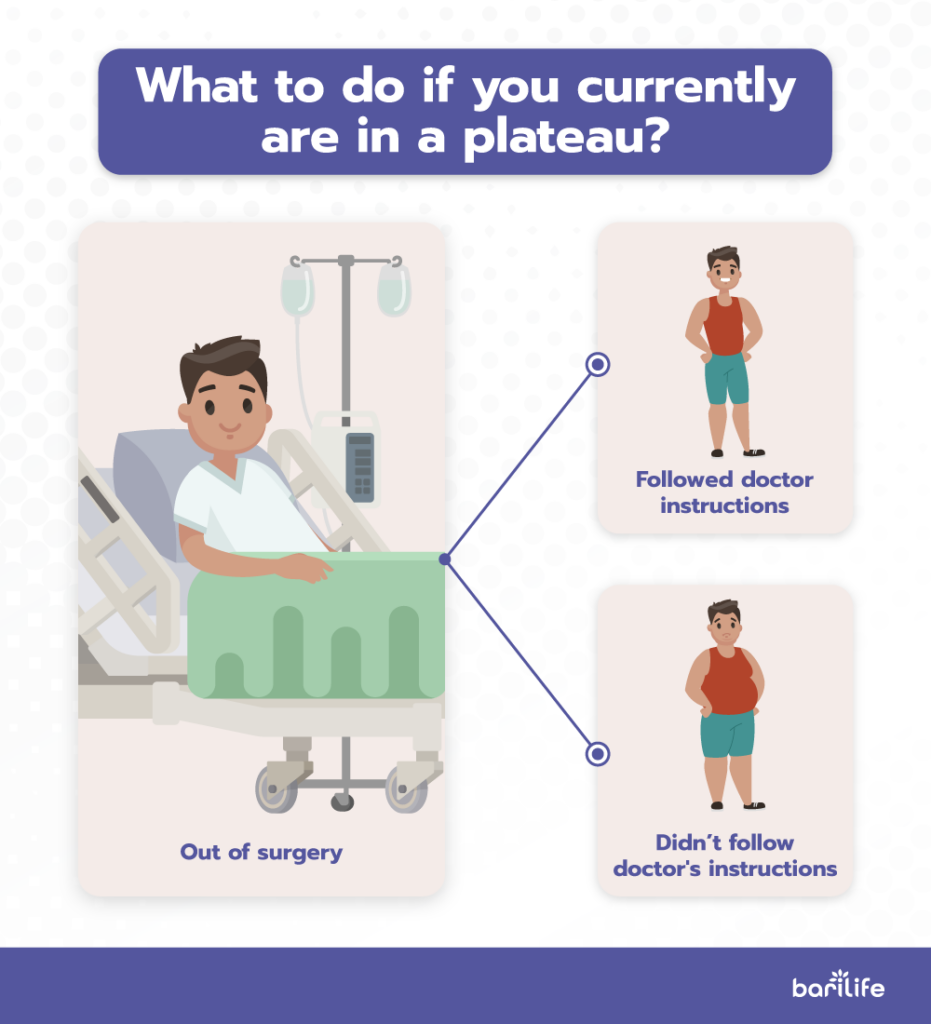
Gastric sleeve surgery
Sleeve gastrectomy is one of the most commonly performed bariatric surgical procedure. The surgery is usually performed laparoscopically, which involves inserting small instruments through multiple small incisions in the upper abdomen. During sleeve gastrectomy, about 80% of the stomach is removed, leaving a tube-shaped stomach about the size and shape of a banana.
The gastric sleeve surgery is successful at facilitating weight loss because it reduces stomach size, allowing people to feel full more quickly while eating less. It also changes hormone levels causing people to feel less hungry, and increases stomach motility, which makes food pass through the stomach and intestine faster.
Expected weight loss
The gastric sleeve has a success rate of about 80-90%. Studies have shown that most patients lose an average of 2-4 lbs, or 0.9-1.8 kg, a week for the first 6 months to a year following surgery.
Rapid and significant weight loss usually occurs in the first month following surgery due to the restrictive nature of the post-op diet and the loss of water weight. After that, you can expect to lose between 8 and 16 lbs a month on average for the first 6 months. This is only an average, so your results may vary.
Most people can expect to lose about 60-70% of their excess weight in the first year. On average, people reach their lowest weight within 12-24 months of their gastric sleeve surgery.
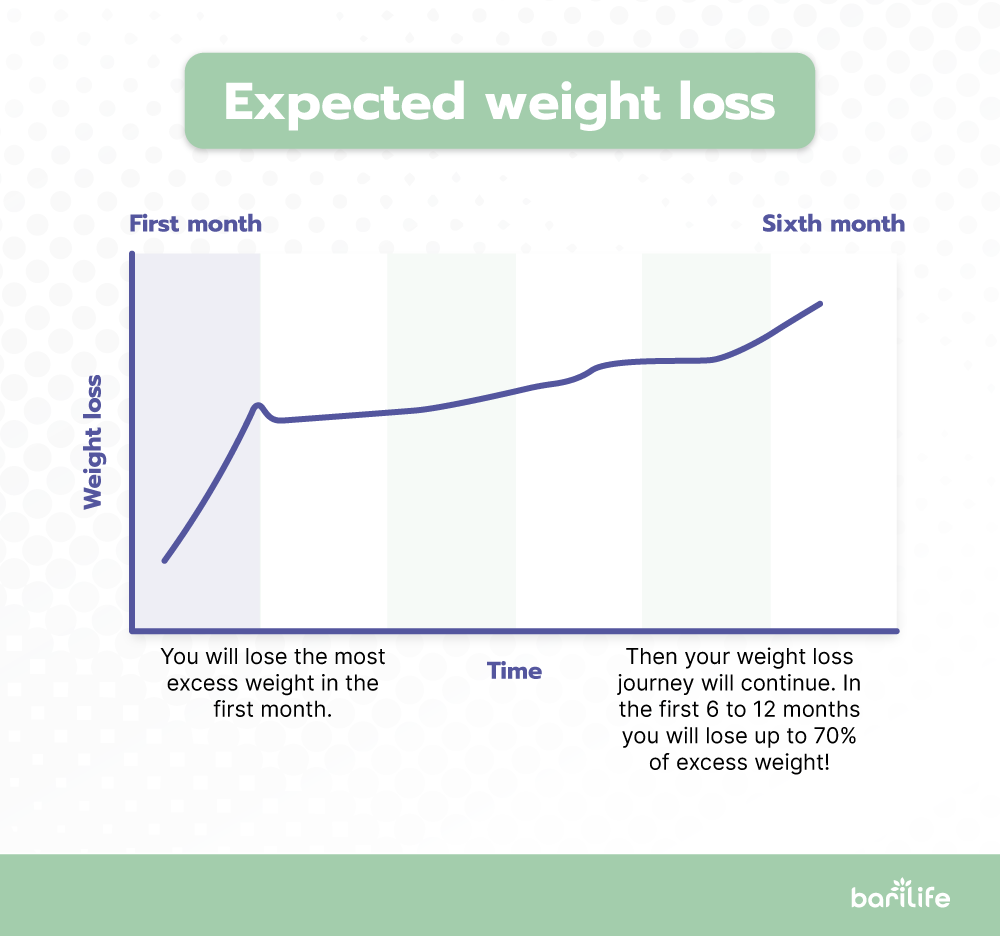
How weight is regained after gastric sleeve surgery
For the first year, often referred to as the “honeymoon phase,” patients are usually highly motivated and committed to their diet and exercise regimen. They maintain proper portions, consume mostly foods that are high in protein and low in carbs and fat, and participate in at least the minimum amount of recommended physical activity (150 minutes per week).
As recovery from surgery continues and patients begin to tolerate a wider variety of foods, many begin to eat more and move less. Weight loss begins to plateau and eventually starts to climb. About 25% of patients will regain all of their lost weight within 10 years.
According to a recent review, most behaviors associated with weight regain after bariatric surgery are modifiable. Behaviors include poor diet (excessive calorie, carbohydrate, and alcohol intake), grazing or binging, lack of physical activity, and failure to consistently follow up with the bariatric surgery team.
Studies show that long-term weight regain occurs in about 13-30% of patients after gastric sleeve. According to this data, you might gain anywhere from 2% of your weight back to well over your starting weight.
Weight loss in the first 1-3 months after surgery can be a good indicator of long-term weight loss. Adopting diet and lifestyle modifications early on is highly recommended for anyone that may be at risk of poor weight loss outcomes or weight regain.
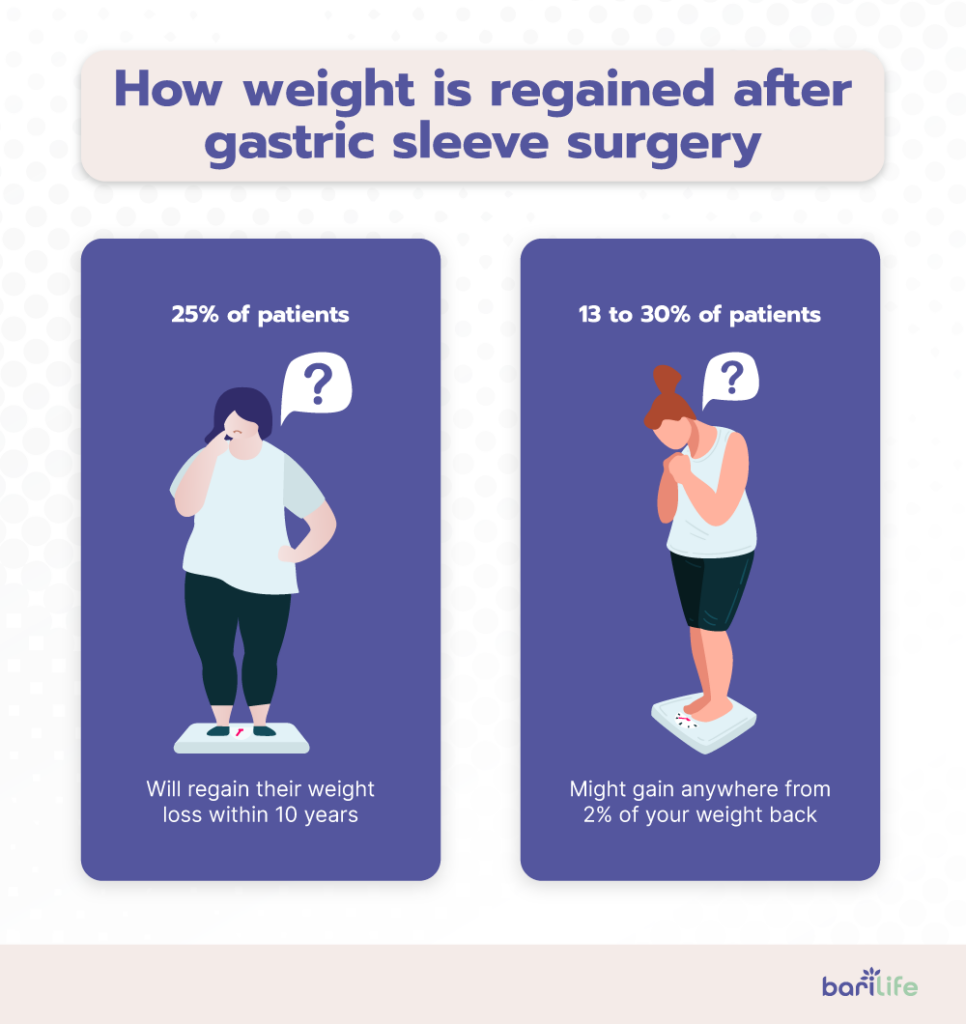
Preventing weight regain after gastric sleeve surgery
Weight gain after gastric sleeve surgery is not uncommon. While weight regain after bariatric surgery can occur, there are some things you can do to prevent it. Ways to prevent weight regain include:
- Following up regularly with your bariatric surgeon to keep weight loss on track.
- Being consistent with your recommended meal plan and eating high protein to preserve lean muscle mass, limiting carbohydrate and fat intake.
- Limiting portion sizes.
- Avoiding snacking and grazing. This can disrupt regular hunger and fullness cues and lead to excess calorie intake.
- Participating in at least 150 minutes of moderate-intensity exercise per week. This should be a combination of cardiovascular and strength exercise.
- Seeking a bariatric surgery support group if you’re having difficulty adhering to the recommended lifestyle changes.
- Reaching out to your bariatric surgeon and dietitian for support. They want you to be successful in maintaining your weight loss long-term. Don’t be embarrassed if you regain weight. Obesity is a chronic, multi-faceted condition that conditions your body to gain weight.
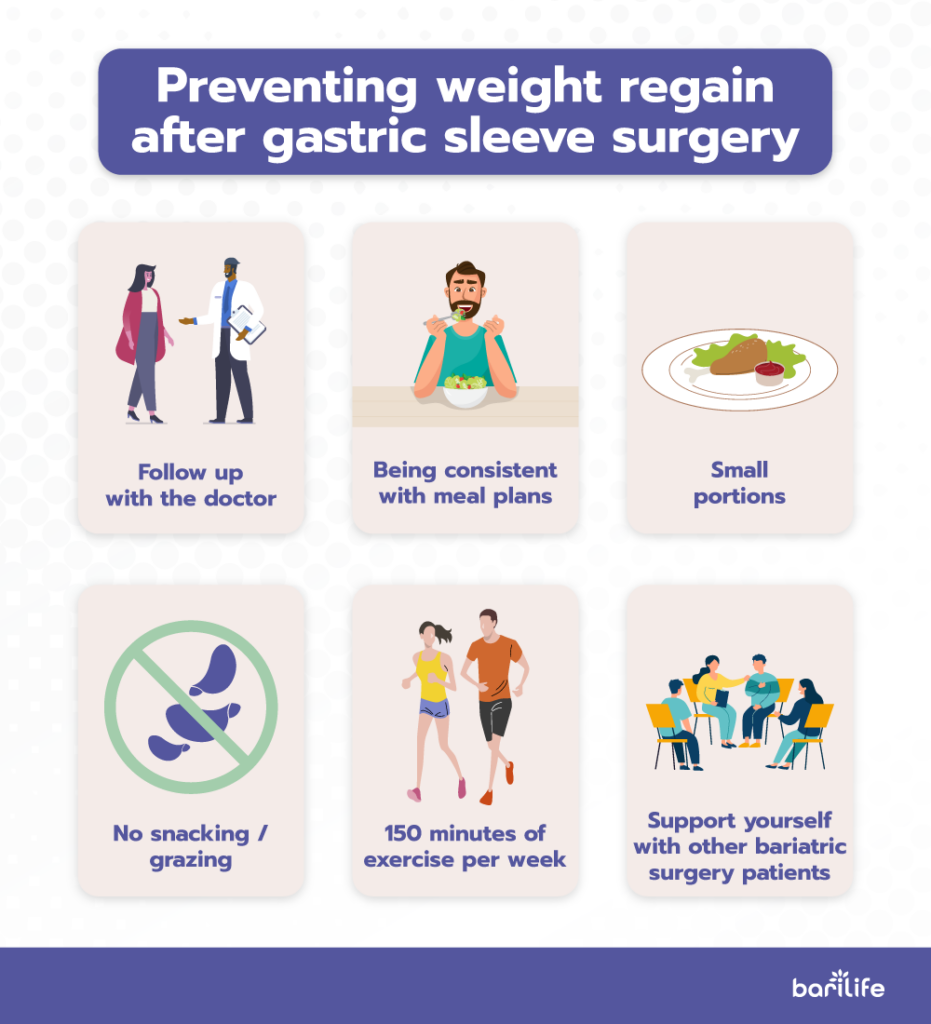
Complications of weight regain
Along with the weight loss after gastric sleeve surgery, improvements are also seen in obesity-related diseases including diabetes, hypertension, high cholesterol, and heart disease.
When weight is regained, it can have adverse effects on your health and well-being. Gaining weight after gastric sleeve surgery can:
- Cause comorbid diseases to return
- Negatively affect your quality of life and mental health
Weight gain can cause obesity-related diseases to return even if there was remission following your surgery. It is important to monitor for signs and symptoms of obesity-related diseases if significant weight gain has occurred.
Weight regain can also have a negative impact on quality of life. It is suggested that weight gain of about 15% or more led to a quality of life that was similar to the quality of life of obese people that were heavier and did not have any surgical intervention.
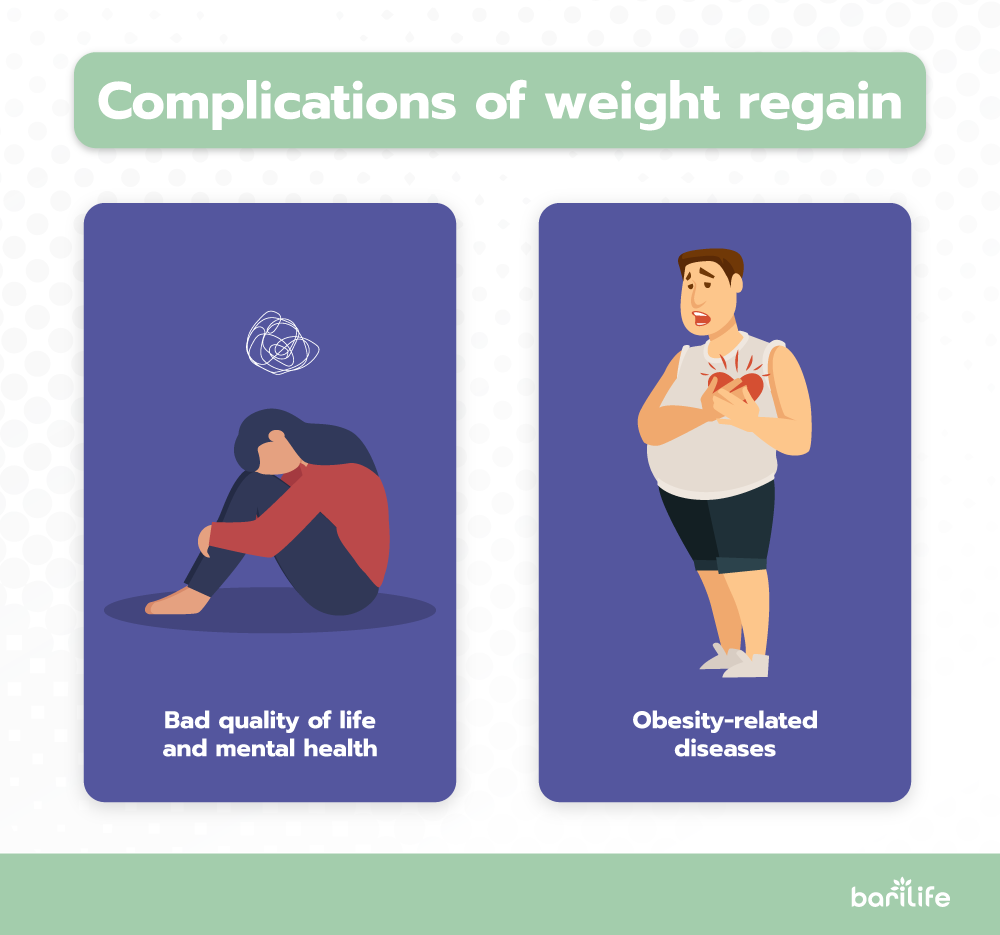
Jumpstart weight loss after regain
If you have regained some of the weight, don’t panic. There are several changes you can make to help restart weight loss again. Returning to what worked in the beginning can often put a stop to weight gain and help you get back on track.
- Honestly evaluate your eating habits. Have you been eating larger portions? Have you been eating out more often? Are you grazing throughout the day or binging?
- Start tracking the foods you eat (beverages, too!), so you have an accurate idea of how many calories you are consuming.
- Decrease your calorie intake by reducing portion sizes and avoiding snacks/grazing between meals.
- Limit or avoid caloric beverages.
- Aim for at least 75 grams of protein a day for men and 60 grams for women, unless otherwise specified by your surgeon or dietitian.
- Engage in a minimum of 150 minutes of moderate intensity exercise per week. To increase weight loss, participate in 30 minutes of low-intensity exercise daily (walking, biking, yoga), and 3 days of muscle strengthening exercise per week.
- Consistently take recommended multivitamins daily.
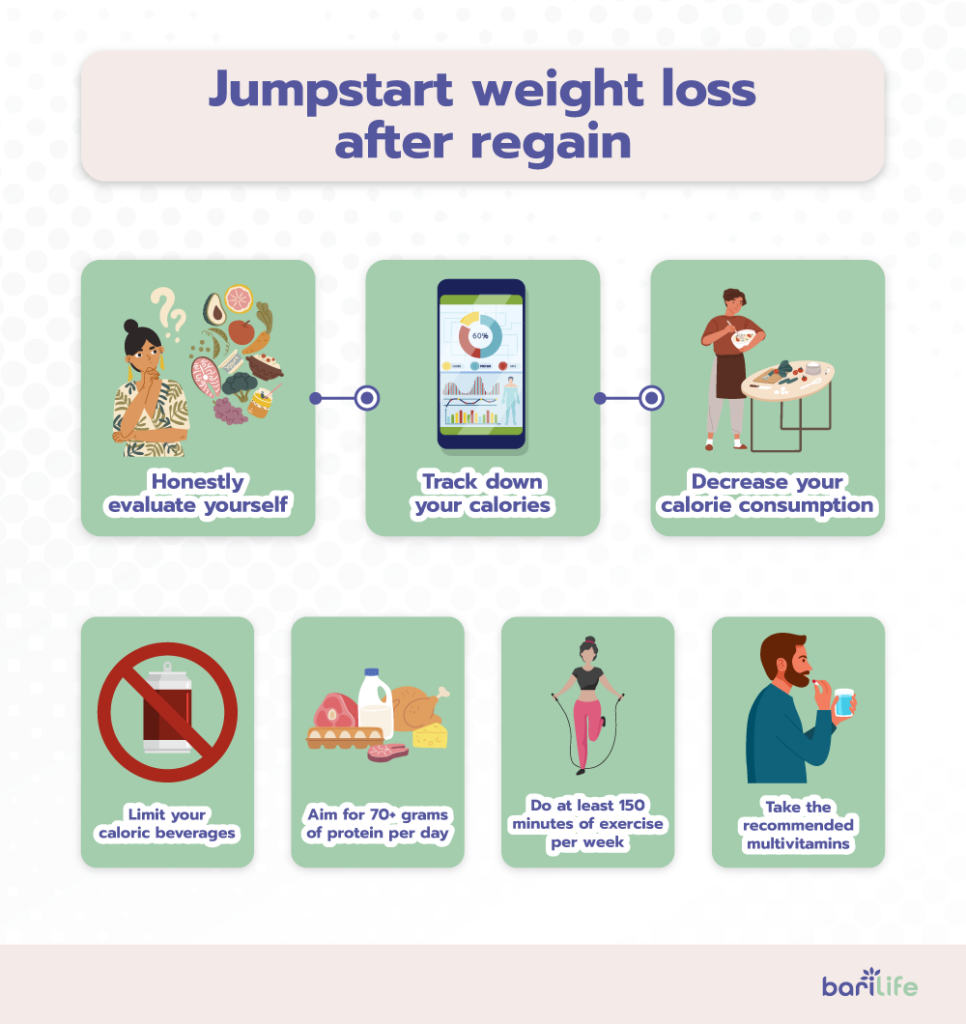
Final thoughts
Weight loss immediately following a sleeve gastrectomy often seems effortless. The excess weights seems to just rapidly fall off during this “honeymoon phase.” However, if proper diet and exercise habits are not implemented and maintained, weight loss plateau or even weight regain can occur.
Although not uncommon, weight regains after gastric sleeve surgery can cause significant health concerns. Not only is the weight gain harmful, but obesity-related diseases that may have entered remission following surgery can also return. If you have gained weight after gastric sleeve surgery, you should contact your bariatric treatment team for support along with tightening your diet and exercising regularly.




What are your tips and tricks to post-bariatric success?